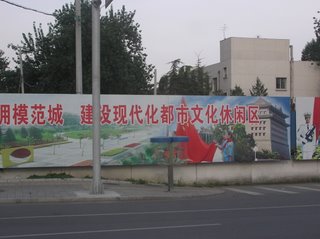Beijing: A City of Slogans

The obsolete, rude and uncivilized images of the old city under the rule of the Emperor and the Communist party in the past as described in films had deeply rooted in my mind. The five-day study trip to Beijing has changed my preoccupied perception of the capital. After paying a visit to Beijing City Planning Museum, I was stunned by the rapid development of the city in the last few decades. Infrastructure projects including the new runway of the capital airport, underground mass transit system and countless flyovers and highways are the token of the rocket speed development of the city.
However, the fabulous infrastructure alone doesn’t help much in boosting the city’s image. To better prepare for the 2008 Olympic Games, the city government is now launching a cultural and spiritual reengineering programme in order to build a civilized and tourist friendly city. Slogans such as ‘Building a civilized city’, ‘Dos and Don’ts of a civilized person’ are found everywhere. I just wonder how effective these slogans are. The culture of slogans is quite common in Chinese society but I don’t think they are effective. Most of the slogans will eventually become nothing more than lips service. The change of culture can never be done in a couple of years. We are all familiar with the old saying, “Bad habits die hard”. To change the bad habits deeply rooted in people, we have to start from schools and families. The media and regional social service organizations may offer a big help in cultural building but it takes effect only when the campaign is sustainable and long enough.
My personal opinion on the successful cultural shift in Beijing is pessimistic. I never question the political will of Communist Party in launching any campaigns. The major obstacle is that the time scale for such change far exceeds two years, which may be enough for the physical preparation of the 2008 Olympic Games.

0 Comments:
Post a Comment
<< Home